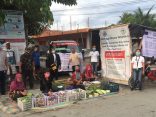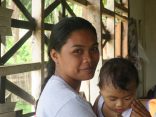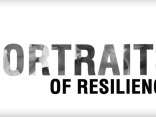Field report from Xyla Ortinero
In photo: Xyla (left) listens to the gathered women of Barangay Tan-Awan in Dolores, Eastern Samar. Typhoon Hagupit / Ruby made its first landfall in Dolores.
Downed trees and power lines. Flooded communities. Closed markets. Destroyed houses and livelihoods. People picking up the pieces and trying to rebuild. These are the sights in Samar where we were deployed.
Back when I was Area Coordinator for our Bohol earthquake response, my teammates would tell me, "Ok lang umiyak, tao tayo at bata pa. Pero push pa rin tayo ha, kaya yan. (It's ok to cry, we’re young and human after all. But let's continue to push, we will pull through.)"
Those words recharge my will as I listen to mothers, senior citizens and community leaders tell their stories. Yes, we will all pull through. Push pa.
Field report from Xyla Ortinero
In photo: Xyla (left) listens to the gathered women of Barangay Tan-Awan in Dolores, Eastern Samar. Typhoon Hagupit / Ruby made its first landfall in Dolores.
Downed trees and power lines. Flooded communities. Closed markets. Destroyed houses and livelihoods. People picking up the pieces and trying to rebuild. These are the sights in Samar where we were deployed.
The ACCORD team conducted rapid needs assessment, 36 hours after Typhoon Hagupit (local name: Ruby) made its first landfall. We’ve done this before, I tell myself, but I am still shaken by what I see, especially when it's people holding signs asking for help along the highways. Filipinos are proud and strong people, to see them asking for help on the streets is really something else.
Surveying the Damages
We drove about 80 kilometers north that day, from Borongan City to the municipality of Oras in Eastern Samar.
People were coming back from evacuation centers, but most of the homes they were returning to are gone. The provincial government told us that at least 46,000 families (equivalent to more than 220,000 people) were affected by Hagupit. More than 35,000 houses were damaged.
Newly planted rice and bananas were destroyed. For this to happen to farming communities during the lean season, it’s a big blow. For those who may have the money, markets are closed so they can't buy what they need. Families have already received 4 kilograms of rice from the Department of Social Welfare and Development (DSWD) in several affected municipalities, but harvest is nowhere near so people still have a great need for food in the coming days.
Residents told us of historic flooding, reaching up to 3 feet in some areas that are not low-lying. This contributed to the contamination of communal water sources such as deep wells. But they still use these wells for drinking, washing their clothes and bathing – they don't have much options at the moment.
Pushing, Extending
Hagupit may not be as strong as Haiyan (Yolanda) which flattened vast areas last year. But the situation is still bad. The people here express the need for food and potable water, as well as emergency shelter to keep them safe from the elements.
I admit, this pace is tiring. Lots of coordination meetings and (satellite) phone calls, moving from one town to another despite the damaged road and bridges, power interruptions and intermittent mobile communication signals – they take their toll on one's energy and spirit. But assessing needs and capacities while extending simple, human empathy to the affected communities – it's worth it. Knowing that you are doing your own small part in helping your fellow man recover can really keep you going.
My last tour of duty with ACCORD was as Area Coordinator for our Bohol earthquake response. There were times that I would cry during meetings that I was supposed to facilitate – there were too many things to do and deadlines we set were tight, mindful of the emergency situation. My teammates would tell me, "Ok lang umiyak, tao tayo at bata pa. Pero push pa rin tayo ha, kaya yan. (It's ok to cry, we’re young and human after all. But let's continue to push, we will pull through.)"
Those words recharge my will as I listen to mothers, senior citizens and community leaders tell their stories. Yes, we will all pull through. Push pa.
Xyla, a graduate of BS Forestry from UP Los Banos, has been with ACCORD since 2010, leading the implementation of various disaster risk reduction and humanitarian response actions. She is now preparing the communities for our distribution of emergency relief before this week ends – finalizing masterlists, explaining processes, and liaising with local government officials and NGO partners.
Relief packages will contain food (5kg of rice and canned goods), emergency shelter materials (such as plastic sheets and tarps), and hygiene and water kits. We are looking to do more with your help. Visit www.accord.org.ph/hagupit-appeal, call us at (+632) 373-0196, or email us at information.accord@gmail.com. ACCORD has a long track record of providing quality humanitarian assistance during emergencies; we will ensure that your donations will go to where there is greatest need.
ACCORD’s Executive Director Marieta Lupig-Alcid is available for interviews. Please contact Isabelle Baguisi (isabelle.baguisi@gmail.com) or Darwin Masacupan (dmmasacupan@gmail.com) to arrange interviews and for all other media inquiries.




